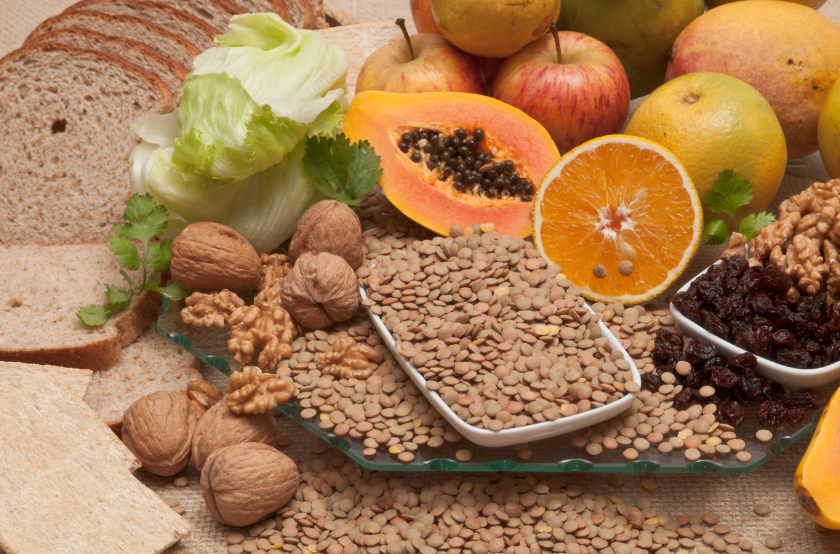Friend or foe? Carbohydrates and what to do to make them work for you?
I hear the misbelief all too often that carbohydrates make you gain weight and omitting it from you diet will help you lose weight. While there is a time and a place for a lower carbohydrate diet under specific circumstances, routinely avoiding this important nutrient might not only stop you from losing weight, but will probably do the opposite.

The dangers of carb ditching
Generally speaking, you shouldn’t stay away from carbohydrates if you want to be healthy. Your fruit and vegetables and grains all mostly made of carbohydrates, and they are an important source of energy and essential nutrients.
Here’s what you should think about.
What goes in instead?
Lowering your carbohydrate intake involves decreasing the consumption of certain groups of foods from your diet, or omitting them completely.
Besides sugar sweetened foods, like cakes or biscuits, these food groups are bread, pasta and starchy vegetables like pulses and legumes, and other vegetables and fruit.
When you don’t eat these food groups, you replace them with proteins and fats, pushing your diet out of balance. With fats providing more than twice as much calories as carbohydrates do, you likely end up consuming more.
If you do lose weight on a low carbohydrate diet, it is likely because you managed to consume less calories, not because you consumed less carbohydrates. But in the meantime, you very likely are eating less nutrient dense food, which might cause some issues.
What are you missing out on?
Carbohydrate containing foods are not only our main sources of energy, but they are also main sources of important nutrients like vitamins, minerals and fibre.
A low carbohydrate diet might deplete your nutrient stores over time, and you might find yourself tired, or start experiencing some deficiency symptoms.
Your metabolism (the system that produces energy from the food you eat) relies on several different nutrients. In the lack of these, it can’t work smoothly.
Fibre is crucial for your gut, which supports other important functions, like your brain or your immune system – you want to keep these healthy and fully functioning, too!
How to make carbs work for you
Instead of randomly reducing your carb intake, there are several ways you can make this important macronutrient a part of your daily diet in a safe and healthy way.
When you eat them, how you eat them, and what types of carbohydrates you eat makes all the difference.
Here are 5 things you can do to make them work for you, instead of against you.
Replace simple, fast releasing carbohydrates with complex, slow releasing ones
Not all carbohydrates are created equal. Simple, fast releasing, or refined carbohydrates are those that are lacking meaningful amounts of any nutrients besides glucose.
These include sweets, white bread, bakery products. They have high glycemic index, which means that they raise the levels of glucose in your blood quickly.
Complex, slow releasing carbohydrates are those that are present in your food with other important nutrients, like fibre, proteins, or fat. These foods also contain important vitamins and minerals.
Good examples are wholegrains, legumes or avocado. Your body needs time to “unwrap” the carbohydrates in these foods to turn them into glucose which makes them slow releasing, with a lower glycemic index.
Find out when your body processes carbohydrate best and eat most of your daily carbs that time
Everyone’s metabolism works differently. You might process the same food more effective in the morning, than in the evening, or the other way around, and it is also possible that certain foods are processed faster by one person and slower by another.
These differences can result in a faster or slower rise in blood glucose levels by the same food at different times of the day, or between different people.
If you think this is something that could be useful to you on your health journey, a series of finger prick tests or a continuous glucose monitor can help you find out how you process different types of foods.
If you would like to try this, consult with a health professional.
Stick to the right order
By eating the food in a certain order off your plate can make a bigger difference in your post prandial (after-meal) glucose levels than you think. Try this: first eat your vegetables, then your protein (meat, fish, tofu), then your starches (potatoes, rice or other grains).
The fibre in your veggies create a protective layer in your intestines, slowing down glucose absorption. Proteins and fats slow it down further, and by the time you get to your potatoes, the “safety net” is up, and those starches will need time to make their way through it.
Don’t eat your fast releasing carbohydrates alone
As I mentioned before, fast releasing carbs are released fast, because they are not “locked in” in a protein or fibre matrix. If you eat something that is lacking these nutrients, you can add them in yourself, too.
It’s ok to treat yourself with the occasional pastry, or ice cream. When you do, for the best result, try to eat them straight after a balanced meal.
If you eat them between meals you can still “slow them down” by eating them with something fibrous or with some protein.
To make them act more gently, add in
- a banana
- a handful of berries
- some peanut butter
- Greek yogurt
- a handful of nuts
Sync your carb intake with your cycle
Your insulin sensitivity naturally changes throughout your cycle, in sync with the changes of your hormone levels. While healthy carbohydrates should always be a part of your daily meals, your treats are best synced with your hormonal phases.
Choosing to eat those during phases when your body can handle it better, can be a real game changer in your metabolic health.
There isn’t a one-size-fits-all recipe
As we all function differently, there is no general rule to how to set your personal carb rhythm. Some people absolutely need carbohydrates first thing in the morning, otherwise they get light headed. Others have to go easy on them at this time of the day, or it throws their glucose metabolism out of balance for the entire day.
At WholeSoMe we explore your individual rhythm and set your carb intake accordingly, to make sure that your blood sugar levels remain balanced throughout your day, your hormones are happy, and they are making you happy, and that it supports you best in your weight management goals.
Your takeaway
Not all carbohydrates are created equal. Health promoting, complex carbohydrates should always be a part of your daily meals.
Refined carbohydrates need to be handled with care, though.
These 5 carb hacks can help make carbs work for your metabolic health rather than against it.
How you adjust your intake will depend on your individual metabolic type.
Explore your individual balance with WholeSoMe Nutrition.
Related Reads…
The basics of weight loss medications
5 easy-to-make, refreshing summer drink recipes to enjoy at home
Not all fibre are created equal – how to support glucose metabolism better
WholeSoMe Nutrition
Northumberland, UK
+44(0)7437 576011
© WholeSoMe Nutrition. All rights reserved.
Pictures by Canva Pro and freepik.com
Book a free discovery
call to see how can
nutrition consultation
improve your health
Book a free discovery
call to see how can
nutrition consultation
improve your health
WholeSoMe Nutrition
Northumberland, UK
© WholeSoMe Nutrition. All rights reserved.
Pictures by Canva Pro and freepik.com




